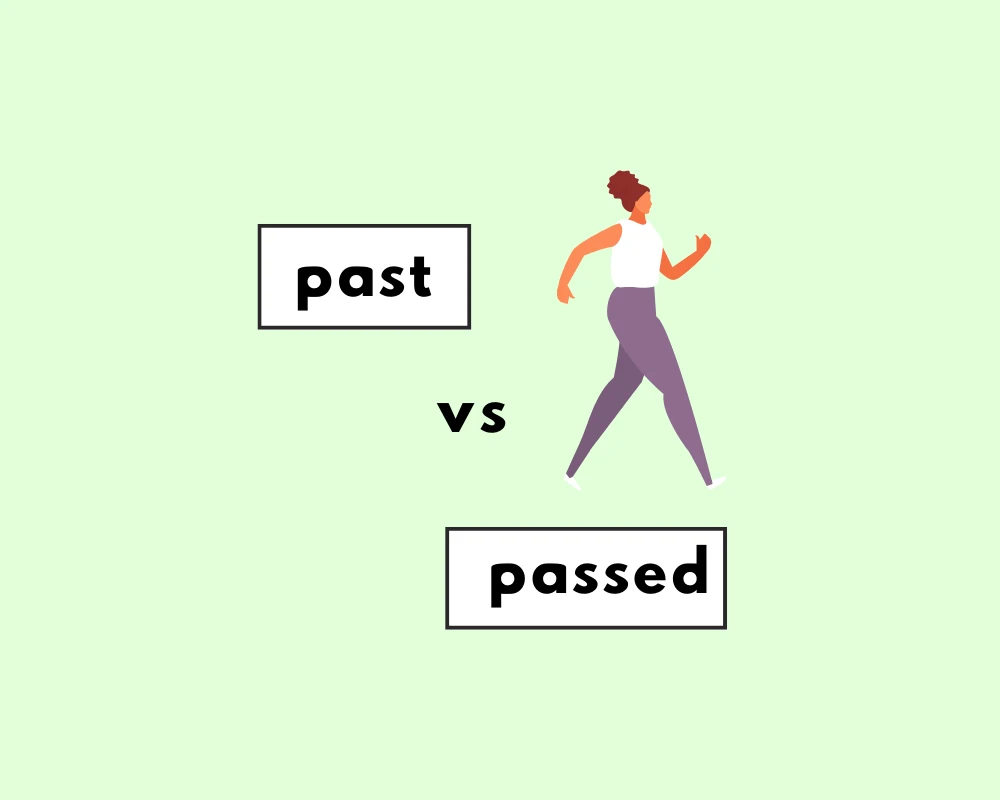“Past” vs. “passed”, explained
Both past and passed have to do with movement or time. Semantically they’re not totally dissimilar; it’s easy to see why these two words are readily confused with each other! Let’s get past the confusion, and clear up any questions you have on this pair of homophones.
She finally passed her medical exam.
He walked right past me without saying hello.
I past the ball to my teammate.
In the passed, people wrote more letters.
Is it “I walked past” or “passed”?
| Examples with “past” | Examples with “passed” |
| The past month has been really busy at work. | Three students in the class passed with distinction. |
The answer to the question is, “I walked past“, but why? When it comes to confusing words, the first order of business should always be to find which part of speech each words belong to.
Passed is a verb and the past tense of pass. To pass means, “to move, proceed or go”. Read these sentences that show the correct use of passed:
She hasn’t passed her driving test yet.
I had no idea whether I’d passed or failed.
Three students in the class passed with distinction.
The boat was too tall to pass under the bridge. (present tense)
Past is an extremely versatile word: it can function in sentences as an adjective, a preposition, a noun, or an adverb, though its meaning differs depending on the context in which it’s used.
As an adjective, past refers to a previous time or to something that was done at an earlier time than now:
The past month has been really busy at work.
She was good at her job because of her past experience.
As a preposition, past means “beyond (a particular place)”, or on the other side of something/someone. As in:
We live in the house just past the church.
He walked straight past us!
I walked past them without saying hello.
Past as a preposition is also often used in reference to time. We say, ‘half past six’, (or whatever the time is) to show that it is later than that time. Additionally, as a preposition, past means, “above or further than a particular point or stage”. As in:
She’s past the stage of playing with toys.
These flowers are past their time.
Unemployment is now past the 3 million mark.
This one’s easier: as a noun, past references an earlier period or time:
I went there often in the past.
He had hurt her many times in the past.
She had learned from her mistakes of the past.
These sentence examples are a bit emotionally intense, but you get the point—they speak of a previous time—from the past (not passed!)
Just in case all of that that wasn’t enough already, let’s toss in the adverb usage, for good measure. Like I said, past also appears as an adverb, and it’s used to either describe the passing of time or moving from one spot to another. By the way, that’s the difference between ‘walked past‘ and ‘walked passed‘. Here are some examples:
She smiled at me as she walked past.
I called out to him as he ran past.
Past, as an adverb, describing the past of time:
A week went past and nothing had changed.
The next two hours seem to whizz past.
Synonyms of passed
As in gone
- elapsed
- gone
- left
- missing
- moved
- deceased
As in approved
- recognized
- affirmed
- endorsed
- permitted
- allowed
“passed” uses the verb tense “ed”—think: “I passed the test” uses an action, therefore needs the extra “ed” like other past tense verbs.
Synonyms of past
The correct synonym for past will depend on the usage given the context.
- previous
- prior
- over
- gone-by
- before
- before present
- earlier
Quiz: past vs. passed
- She walked _______ the park on her way to work.
a) past
b) passed
- Time has flown ____ since we last met.
a) past
b) passed
- He _____ the exam with flying colors.
a) past
b) passed
- The car ____ us on the highway at great speed.
a) past
b) passed
- I can’t believe a year _ since we started this project.
a) has past
b) passed
- She _____ the ball to her teammate during the game.
a) past
b) passed
- The river flows _ the small town.
a) past
b) passed
- Have you ever _ by that old abandoned house?
a) past
b) passed
- They _ the torch to the next generation.
a) past
b) passed
- The bus just _____ our stop; we missed it.
a) past
b) passed
Answers
- a) past
- a) past
- b) passed
- b) passed
- a) past
- b) passed
- a) past
- a) past
- b) passed
- a) past
Check out other commonly confused words!
Work Sheet
Which sentence uses ‘passed’ correctly?
According to the post, how can ‘past’ function in a sentence?
Which sentence correctly uses ‘past’ to indicate movement beyond a point?
What part of speech is ‘passed’ when used in the sentence “Three students in the class passed with distinction.”?
Which sentence correctly uses ‘past’ as an adjective?
He the finish line in record time.
The house is just the old oak tree.
In the , we didn’t have smartphones.
She was worried she hadn’t her driving test yet.
It’s half six.
Frequently Asked Questions
Is ‘past’ a verb?
+
What part of speech is ‘passed’?
+
When do you use ‘past’ as a noun?
+
When is ‘past’ used as preposition?
+
Is it ‘walked past’ or ‘passed’?
+
Yash, D. "When to Use Past vs. Passed?." Grammarflex, Jun 19, 2025, https://www.grammarflex.com/on-the-difference-usage-of-past-or-passed/.
Sources
-
Past, Oxford Learner’s Dictionary, accessed on Oct 2, 2023.











